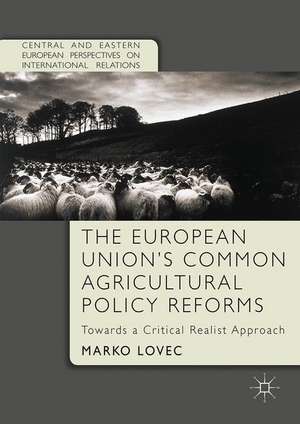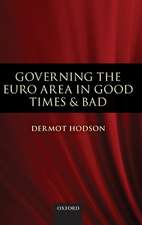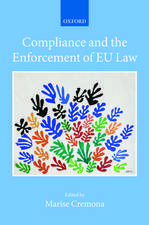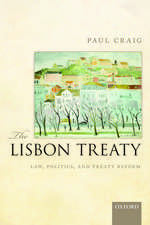The European Union's Common Agricultural Policy Reforms: Towards a Critical Realist Approach: Central and Eastern European Perspectives on International Relations
Autor Marko Lovecen Limba Engleză Hardback – 19 aug 2016
The reforms that the European Union’s CAP underwent during the last three decades were intended to make it less trade-distorting, more taxpayer-friendly and more able to meet the new challenges of environmental concerns and rural development/territorial cohesion. The outcome of the reforms has, however, contradicted these objectives, with the controversies being reiterated by the mainstream theoretical approaches in the field.
European Union’s Common Agricultural Policy Reforms argues that these controversies are due to reductionist, rationalist and idealist assumptions with regard to the object of inquiry applied by mainstream approaches. It proposes an alternative critical approach that takes into account the role of real material factors. Critical realism isnot just an alternative explanation of CAP reforms but an alternative theory of how explanations can be made, which enables readers to reflect upon and endorse the results of existing lines of research in proceeding towards deeper level theory.
Preț: 386.61 lei
Nou
Puncte Express: 580
Preț estimativ în valută:
73.98€ • 79.11$ • 61.68£
73.98€ • 79.11$ • 61.68£
Carte tipărită la comandă
Livrare economică 18 aprilie-02 mai
Preluare comenzi: 021 569.72.76
Specificații
ISBN-13: 9781137572776
ISBN-10: 1137572779
Pagini: 178
Ilustrații: XIII, 195 p. 1 illus.
Dimensiuni: 148 x 210 x 18 mm
Greutate: 0.38 kg
Ediția:1st ed. 2016
Editura: Palgrave Macmillan UK
Colecția Palgrave Macmillan
Seria Central and Eastern European Perspectives on International Relations
Locul publicării:London, United Kingdom
ISBN-10: 1137572779
Pagini: 178
Ilustrații: XIII, 195 p. 1 illus.
Dimensiuni: 148 x 210 x 18 mm
Greutate: 0.38 kg
Ediția:1st ed. 2016
Editura: Palgrave Macmillan UK
Colecția Palgrave Macmillan
Seria Central and Eastern European Perspectives on International Relations
Locul publicării:London, United Kingdom
Cuprins
Introduction: change and controversy of the European Union’s Common agricultural policy.- PART I: Theoretical framework.- Chapter 1: Existing approaches towards explaining and understanding CAP reforms.- 1.1 Explaining agricultural policy.- 1.2 Explaining Common agricultural policy.- 1.3 Explaining CAP reforms.- 1.4 Understanding CAP reforms.- Chapter 2: Critical realist approach towards explaining CAP reforms.- 2.1 Theories of science.- 2.2 Critical realist explanation of CAP reforms.- 2.3 Research designon: beyond ‘new wine in old bottles’.
Recenzii
“The stated purpose of this book was to test three alternative approaches to explaining and understanding these reforms. … the book is an interesting read and provides the reader with a useful overview of the development of the CAP. At the same time it is thought provoking because it challenges the reader to consider their own approach to science and their understanding of how knowledge is generated.” (Alan Renwick, EuropeNow, europenowjournal.org, November, 2017)
Notă biografică
Marko Lovec is a Research fellow and Assistant Professor at the Faculty of Social Sciences, University of Ljubljana, Slovenia. He specializes in international political economy and European integration, with European Union’s Common Agricultural Policy being his main topic of research.
Textul de pe ultima copertă
This book engages in the controversies of the European Union’s Common Agricultural Policy (CAP) reforms, demonstrating how these are reiterated by mainstream theoretical approaches in the field.
The reforms that the European Union’s CAP underwent during the last three decades were intended to make it less trade-distorting, more taxpayer-friendly and more able to meet the new challenges of environmental concerns and rural development/territorial cohesion. The outcome of the reforms has, however, contradicted these objectives, with the controversies being reiterated by the mainstream theoretical approaches in the field.
European Union’s Common Agricultural Policy Reforms argues that these controversies are due to reductionist, rationalist and idealist assumptions with regard to the object of inquiry applied by mainstream approaches. It proposes an alternative critical approach that takes into account the role of real material factors. Critical realism is not just an alternative explanation of CAP reforms but an alternative theory of how explanations can be made, which enables readers to reflect upon and endorse the results of existing lines of research in proceeding towards deeper level theory.
The reforms that the European Union’s CAP underwent during the last three decades were intended to make it less trade-distorting, more taxpayer-friendly and more able to meet the new challenges of environmental concerns and rural development/territorial cohesion. The outcome of the reforms has, however, contradicted these objectives, with the controversies being reiterated by the mainstream theoretical approaches in the field.
European Union’s Common Agricultural Policy Reforms argues that these controversies are due to reductionist, rationalist and idealist assumptions with regard to the object of inquiry applied by mainstream approaches. It proposes an alternative critical approach that takes into account the role of real material factors. Critical realism is not just an alternative explanation of CAP reforms but an alternative theory of how explanations can be made, which enables readers to reflect upon and endorse the results of existing lines of research in proceeding towards deeper level theory.























